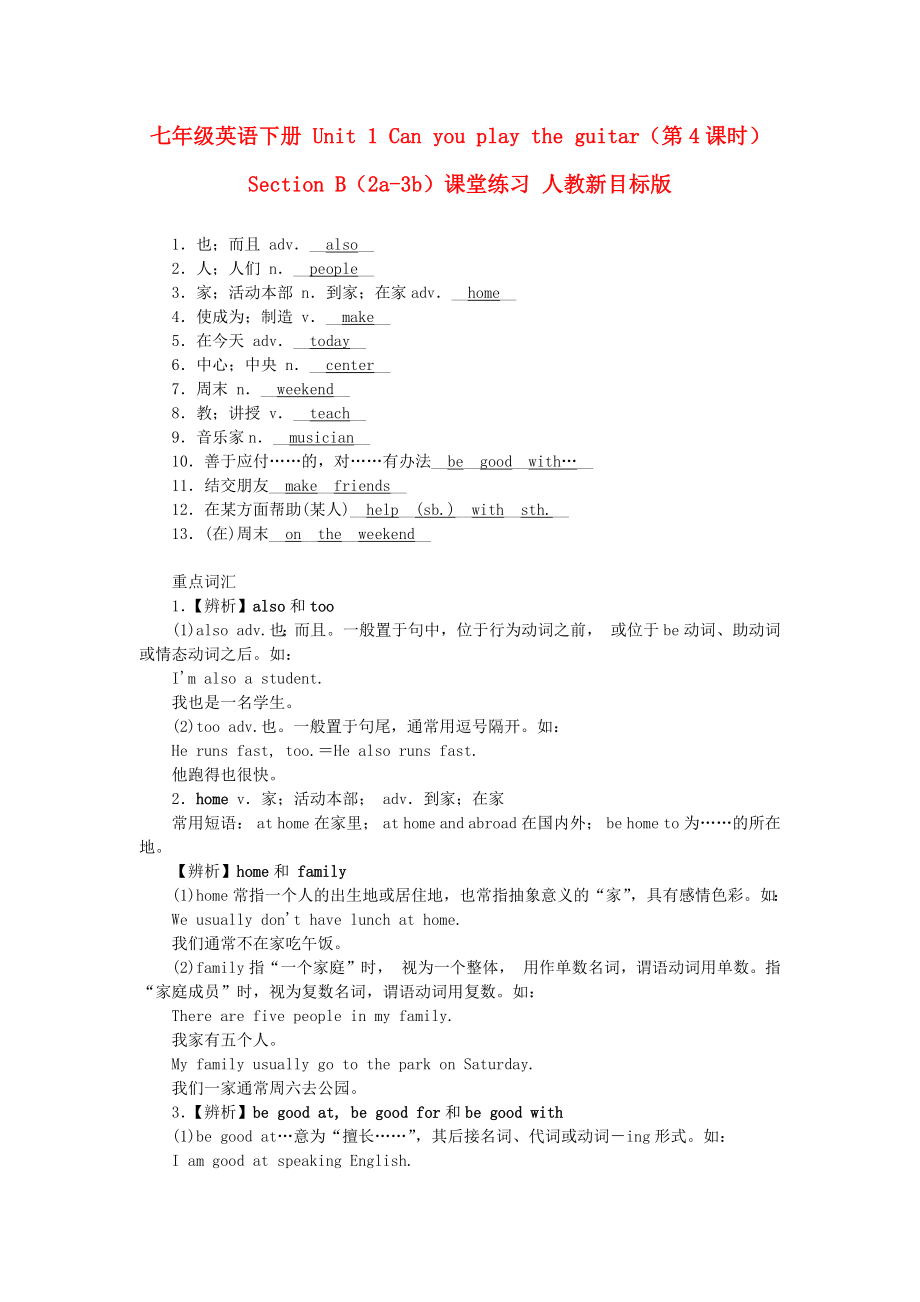《七年級(jí)英語(yǔ)下冊(cè) Unit 1 Can you play the guitar(第4課時(shí))Section B(2a-3b)課堂練習(xí) 人教新目標(biāo)版》由會(huì)員分享�,可在線閱讀�,更多相關(guān)《七年級(jí)英語(yǔ)下冊(cè) Unit 1 Can you play the guitar(第4課時(shí))Section B(2a-3b)課堂練習(xí) 人教新目標(biāo)版(6頁(yè)珍藏版)》請(qǐng)?jiān)谘b配圖網(wǎng)上搜索�。
1、七年級(jí)英語(yǔ)下冊(cè) Unit 1 Can you play the guitar(第4課時(shí))Section B(2a-3b)課堂練習(xí) 人教新目標(biāo)版
1.也�;而且 adv.__also__
2.人;人們 n.__people__
3.家�;活動(dòng)本部 n.到家;在家adv.__home__
4.使成為�;制造 v.__make__
5.在今天 adv.__today__
6.中心;中央 n.__center__
7.周末 n.__weekend__
8.教�;講授 v.__teach__
9.音樂家n.__musician__
10.善于應(yīng)付……的,對(duì)……有辦法__be__good_
2�、_with…__
11.結(jié)交朋友__make__friends__
12.在某方面幫助(某人)__help__(sb.)__with__sth.__
13.(在)周末__on__the__weekend__
重點(diǎn)詞匯
1.【辨析】also和too
(1)also adv.也;而且�。一般置于句中,位于行為動(dòng)詞之前�, 或位于be動(dòng)詞、助動(dòng)詞或情態(tài)動(dòng)詞之后�。如:
I'm also a student.
我也是一名學(xué)生。
(2)too adv.也�。一般置于句尾,通常用逗號(hào)隔開�。如:
He runs fast, too.=He also runs fast.
他跑得也很快。
3�、2.home v.家;活動(dòng)本部; adv.到家�;在家
常用短語(yǔ): at home 在家里; at home and abroad 在國(guó)內(nèi)外�; be home to 為……的所在地。
【辨析】home和 family
(1)home常指一個(gè)人的出生地或居住地�,也常指抽象意義的“家”�,具有感情色彩。如:
We usually don't have lunch at home.
我們通常不在家吃午飯�。
(2)family指“一個(gè)家庭”時(shí), 視為一個(gè)整體�, 用作單數(shù)名詞,謂語(yǔ)動(dòng)詞用單數(shù)�。指“家庭成員”時(shí),視為復(fù)數(shù)名詞�,謂語(yǔ)動(dòng)詞用復(fù)數(shù)。如:
There are five people in
4�、 my family.
我家有五個(gè)人。
My family usually go to the park on Saturday.
我們一家通常周六去公園�。
3.【辨析】be good at, be good for和be good with
(1)be good at…意為“擅長(zhǎng)……”,其后接名詞�、代詞或動(dòng)詞-ing形式。如:
I am good at speaking English.
我擅長(zhǎng)說英語(yǔ)�。
(2)be good for…意為“對(duì)……有益”。如:
Doing eye exercises is good for our eyes.
做眼保健操對(duì)我們的眼睛有好處�。
5、
(3)be good with…意為“善于應(yīng)付……的�;對(duì)……有辦法”�。如:
Are you good with children?
你善于和孩子打交道嗎�?
重點(diǎn)句型
1.Are you free in July?
你七月有時(shí)間嗎?
(1)be free 空閑的�。
(2)在年份、月份�、季節(jié)前用介詞in,還可以用于上午�、下午、晚上等�。如:in 2020 在2020年; in March 在三月�; in spring/summer/autumn/winter 在春天/夏天/秋天/冬天; in the morning/afternoon/evening在上午/下午/傍晚�。
2.Th
6、en we need you to help with sports for English-speaking students.
那么我們需要你幫助說英語(yǔ)的學(xué)生開展體育活動(dòng)�。
(1)need (sb.) to do sth.意為“需要某人做某事”。
(2)help (sb.) with sth.意為“在某方面幫助某人”�。help還可以用于help sb.(to) do sth.結(jié)構(gòu), 意為“幫助某人做某事”�。如:
Could you help me with English?
=Could you help me (to) study English?
你能幫助我學(xué)習(xí)英語(yǔ)嗎?
7�、3.Call Mr.Brown at 293-7742.
撥打293-7742 找布朗先生。
“call sb.at+電話號(hào)碼”意為“撥打某號(hào)碼聯(lián)系某人”�。
【拓展】call sb.=telephone sb.=phone sb.=ring sb.up=give sb.a call 給某人打電話。
4.Can you play the piano or the violin?
你會(huì)彈鋼琴或者拉小提琴嗎?
此句為簡(jiǎn)單的選擇疑問句�,即提問者提供兩種或兩種以上情況,讓對(duì)方從中做出選擇的句子�。它的基本結(jié)構(gòu)是:一般疑問句+or+一般疑問句(后一部分與前一部分相同的成分常常省略)。or連接的是
8�、兩個(gè)并列的成分,要求詞性一致�。
【拓展】(1)回答時(shí),不用yes或no�,而是選擇其中一種情況回答�。
(2)在讀法上,or的前一部分用升調(diào)�,后一部分用降調(diào)。
Ⅰ.根據(jù)句意及首字母或漢語(yǔ)提示填寫單詞�。
1.We always have lunch at home__.
2.Do you play basketball on the weekend__?
3.He can speak English.His sister can also__ speak English.
4.Let's go to the Students' Sports __Center__(中心)!
5.I w
9�、ant to go to the library __today__(今天).
Ⅱ.用括號(hào)內(nèi)所給單詞的適當(dāng)形式填空。
1.We need you to __help__(help) us with English.
2.How many __people__(people) are there in your family?
3.Do you want to make any __friends__(friend) here?
4.Mr.Li __teaches__(teach) them English.
5.His uncle is a great __musician__(m
10�、usic).
Ⅲ.根據(jù)漢語(yǔ)意思完成句子,每空一詞�。
1.他對(duì)孩子很有一套。
He is very __good__ __with__ children.
2.你周末有時(shí)間嗎�?
Are you free __on__ __the__ __weekend__?
3.艾倫常常在寫作方面幫助我�。
Alan often __helps__ me __with__ my writing.
4.凱特喜歡交朋友。
Kate likes to __make__ __friends__.
5.我們常和孩子們交談、做游戲�。
We often __talk__ with kids and pla
11、y games __with__ them.
Ⅳ.閱讀理解�。
A
Music Club
Friday—Sunday 9:00 a.m.—5:00 p.m.
¥20/hour for children(under 12)
¥30/hour for adults
264 Center Street
Tel:504-525-2951
Holiday Restaurant
Monday—Friday 11:00 a.m.—10:00 p.m.
Saturday—Sunday 11:00 a.m.—10:30 p.m.
1403 Jinjiang Road
Tel:50
12、4-410-9997
e to enjoy Dandong seafood.
Movie World
Tuesday—Sunday 10:30 a.m.—9:30 p.m.
¥48 for adults
¥30 for children (under 15)
162 Guangming Street
Tel:504-822-9503
Science Museum
Thursday—Sunday 10:00 a.m.—4:30 p.m.
Ticket price:¥50
132 Xueyuan Street
Tel:504-732-9406
If(如果) you wa
13�、nt to learn about robots(機(jī)器人), wele to the science museum.
(C)1.Nick is 8 years old.He wants to see a movie with his parents.How much should they pay?
A.¥96. B.¥78.
C.¥126. D.¥136.
(A)2.If you want to go to the music club, you can go there on ________.
A.Saturday B.Monday
C.Thursday D.Tues
14、day
(D)3.Fred wants to learn about robots.He can go to ________.
A.Music Club
B.Holiday Restaurant
C.Movie World
D.Science Museum
(C)4.You can call ________ if you are interested in music.
A.504-732-9406 B.504-822-9503
C.504-525-2951 D.504-410-9997
(D)5.Lucy is free on Monday; she can ___
15�、_____.
A.go to the music club
B.watch a movie
C.visit the science museum
D.eat seafood
B
Dear Jonnason,
I get your e-mail and know that you want a Chinese friend, so I write to say hello.Now let me tell you something about me.
My name is Li Liang and I'm thirteen years old.Now I am in Beijin
16�、g with my parents and my sister Li Jin.I'm a student in a middle school.My favorite subject is science because I think it's interesting.But math is difficult for me.This term I join a science club, and it's really fun.We meet at the club on Tuesday afternoon.I'm also good at playing chess, and alway
17、s play chess with my father on Sundays.I like singing and I also like playing basketball.My birthday is on April 16th.My parents always have a party for me on my birthday.What about you?
Write to me please!
Li Liang
(B)6.Who writes the e-mail?
A.Jonnason. B.Li Liang.
C.Nick. D.Li Jin.
(B)7.H
18�、ow old is Li Liang?
A.12. B.13.
C.14. D.15.
(C)8.Li Liang can ________.
A.dance B.swim
C.play chess D.play volleyball
(D)9.Which of the following is TRUE?
A.Li Liang joins a chess club.
B.Li Liang's birthday is in May.
C.Li Liang is an English boy.
D.Science is interesting for Li Liang
19、.
(C)10.Why do they write the e-mails?
A.To get help.
B.To finish a game.
C.To make friends.
D.To answer a question.
Ⅴ.補(bǔ)全對(duì)話�。
A:Can I help you?
B:Yes, I want to join the music club.
A:__1__
B:No, I can't.But I can play the piano.
A:__2__
B:Beethoven(貝多芬).
A:Can you play his positions(音樂作
20、品)?
B:Yes, I can.But only a little.
A:__3__
B:Yes, but only a little, too.
A:Can you have a show for us on Sunday morning?
B:Yes, I can.
A:__4__
B:Jackie.
A:__5__
B:356-962.
A.Can you speak English?
B.Can I have your telephone number?
C.Who is your favorite musician?
D.OK.What's your name, please?
E.Can you sing or dance?
1.__E__ 2.__C__ 3.__A__
4.__D__ 5.__B__
 七年級(jí)英語(yǔ)下冊(cè) Unit 1 Can you play the guitar(第4課時(shí))Section B(2a-3b)課堂練習(xí) 人教新目標(biāo)版
七年級(jí)英語(yǔ)下冊(cè) Unit 1 Can you play the guitar(第4課時(shí))Section B(2a-3b)課堂練習(xí) 人教新目標(biāo)版

